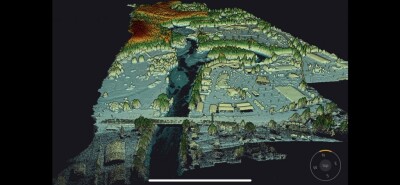Don’t take this the wrong way, but I think I’m spending too much time “preaching to the choir,” as we say down here. With the prices of scanners going down, the introduction of point cloud support for CAD applications and the numerous new photo mapping services, I think the time is right for the opening of new market verticals. To this end, I hope to visit some conferences that have nothing to do with 3D measuring, modeling, or mapping – as far as they know.
My idea was to start with industries that are similar to those with a successful track record when it comes to 3D imaging. The first one that came to mine was industrial food production. When you look at those facilities they are mostly pipes, generators, conveyor belts, etc. It all looks fairly familiar.
So, with that in mind I spoke last week at the Northwest Food Processors Expo and Conference (NWFPA) with Shale Robison of All CAD NW. I didn’t come home with any signed contracts, but I can say that the response was encouraging. Then again, I thought the time was right for new verticals when I went to the DistribuTECH conference in 2006 or 2007. Given the total lack of response I received that time around, my encouragement may be due to my fairly low expectations. While the welcome from the NWFPA was much warmer, the two industries did share a few oddities that should serve as a primer to entering new markets.
- Same words, Different meanings. Even trying to find a track to go to can be a bit disorienting. I thought mapping or maybe engineering would be a good place to start. At DistribuTECH “engineering” was electrical engineering. In food production it covers things like GMO research. Mapping was more like GIS grade surveys with sub-meter accuracy considered an accomplishment. In short, ask exhibitors things like, “How do you replace one of those in an existing facility?” and listen for the verbiage they use as a guide. The equipment may be different, but the problems of working in a congested environment are universal.
- “You must unlearn what you have learned.” Just because the petrochemical or construction industry does it a certain way doesn’t mean that anyone else does. One of the first surprises I had at the NWFPA show was that many of the manufacturers of the various machines on display included installation in the price of the unit(s). Suddenly, I understood why there were not 30 engineering firms exhibiting there. It’s easy to go into full sales pitch mode, but don’t do it until you understand how the game is played or you’ll be displaying your ignorance instead of your experience.
- Don’t forget that You are the newbie. Leave your experience at the door and lead with the assumption that whatever industry you are looking at has the most difficulties and complexities of any industry on the planet. I can assure you that you will meet plenty of people in that industry that believe it to be so! In my experience, empathy will get you a lot further than being a “know-it-all.” Besides, why belittle the problem you are there to solve for them?
- Be prepared to be uncomfortable. I mean this in two very different ways. If you (like me) are accustomed to having the answers to most client’s questions it can be uncomfortable to be in a conversation where you don’t even know the acronyms. Get used to it – and don’t be shy about it. I don’t think there is any shame in admitting that you know a lot about what you do but are just learning about their industry. People who enjoy their work like to talk to others about it and I can promise you that their spouses find their industry as exciting as your spouse finds the delineation between time-of-flight and phase-based laser scanning systems. You want to know, they want to talk, and everyone wins.
- Now, for the second level of uncomfortable. You are going to learn a lot about some part of civilization’s infrastructure and it will not make you feel more comfortable. I never worried about the electrical distribution system until I understood how it was maintained. (I started to type “…how it worked,” but I also learned that no one really does, which made me even more uncomfortable). I love to eat, and having grown up in a rural part of Georgia I’ve always been very aware of food production issues. In fact, my first job out of high school was in a peanut factory. However, things have changed a lot since then. I try to skip the “processed” foods whenever possible. But, I have now come to understand that unless I harvest it in my backyard, food products are processed through machines using lasers, magnets, video ID and robots. Even if that robot packages it labeled as “organic.” “Processed” means something different too…





